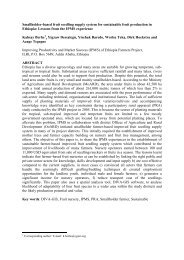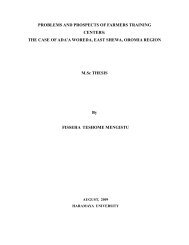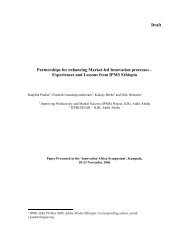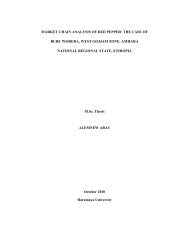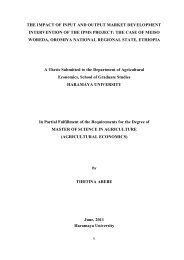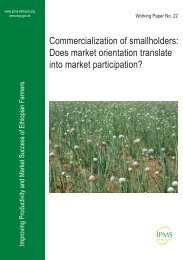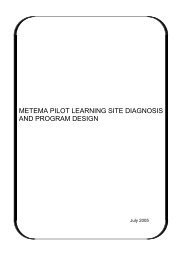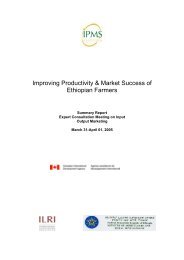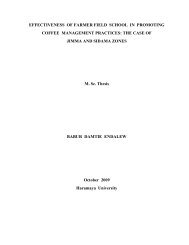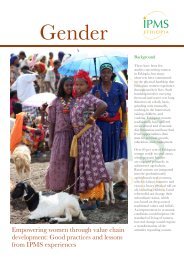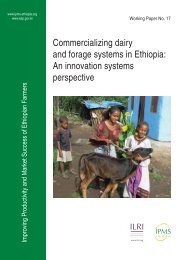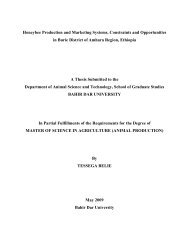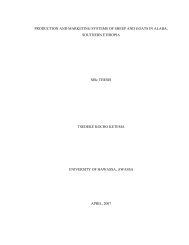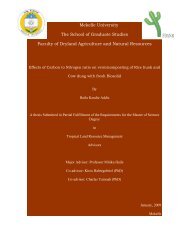effectiveness of modular training at farmers - IPMS Information ...
effectiveness of modular training at farmers - IPMS Information ...
effectiveness of modular training at farmers - IPMS Information ...
You also want an ePaper? Increase the reach of your titles
YUMPU automatically turns print PDFs into web optimized ePapers that Google loves.
Deceased households, social institutions (schools, churches, clinics, etc) th<strong>at</strong> possess excessfarm size, employed civil servants or workers who have accessed for land <strong>at</strong> the time <strong>of</strong>redistribution, committee members who might have owned land in extra amount during landredistribution and the committee also resolves the land shortage discussing with people so th<strong>at</strong>the community gives altern<strong>at</strong>ive solutions for FTCs.Roles <strong>of</strong> the committee <strong>at</strong> district level: Site selection, committee form<strong>at</strong>ion, strengtheninghow income gener<strong>at</strong>ing schemes are implemented, inventory and budget alloc<strong>at</strong>ion systemsand searching altern<strong>at</strong>ive solutions how to access land are the major roles and functions <strong>of</strong>committee <strong>at</strong> district level.FTCs management committee has been collabor<strong>at</strong>ed with development agents fordemonstr<strong>at</strong>ing different income gener<strong>at</strong>ing activities. Activities have been practiced not onlyfor the purpose <strong>of</strong> demonstr<strong>at</strong>ing but also for income gener<strong>at</strong>ing objectives. FTCs have servedfor different purposes. Modular <strong>training</strong>, non <strong>modular</strong> <strong>training</strong>, advisory services and planning<strong>of</strong> development interventions are the common tasks <strong>of</strong> those visited areas. Field report (2009)explained th<strong>at</strong>, the major income gener<strong>at</strong>ing activities th<strong>at</strong> observed by the team were:Poultry production, apiary (for modern, transitional and traditional bee hives), fodder andforage development, hide and skin demonstr<strong>at</strong>ion equipments, dairy, f<strong>at</strong>tening <strong>of</strong> smallruminants, grazing str<strong>at</strong>egies and breeding (bull services), Vegetable and fruit production,irrig<strong>at</strong>ion and w<strong>at</strong>er management systems, post harvest and storage structures, organicfarming (compost making), seed multiplic<strong>at</strong>ion and intensive farming systems, soil and w<strong>at</strong>erconserv<strong>at</strong>ion practices, waste land management, bund stabiliz<strong>at</strong>ion and gully rehabilit<strong>at</strong>ion,w<strong>at</strong>er harvesting structures, land reclam<strong>at</strong>ion with forestry and agro forestry activities.4.6. Challenges and Opportunities <strong>of</strong> Modular Training <strong>at</strong> FTC LevelFor the last five years, there were challenges recognized and identified by key informantinterviews, focused group discussions, documents, and personal observ<strong>at</strong>ions. There are alsoopportunities th<strong>at</strong> can be tailored for effective <strong>training</strong> processes and functioning <strong>of</strong> FTCs.68



